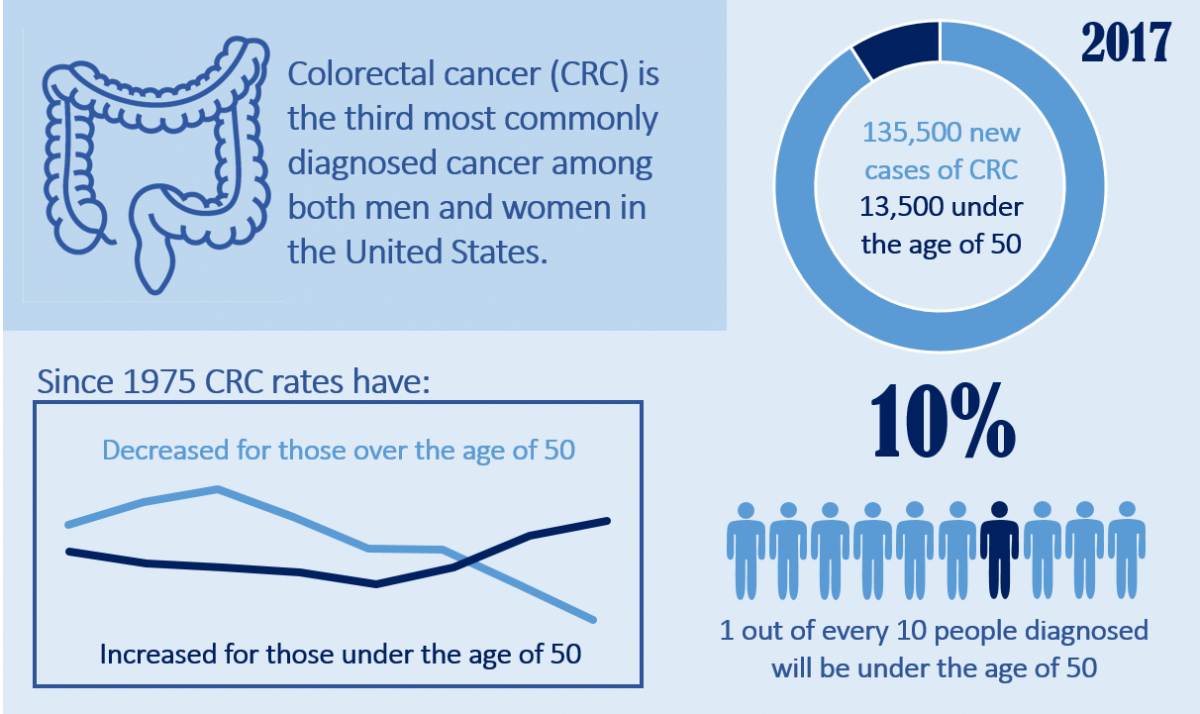Young Adult Colorectal Cancer
I did not sign up to be a doctor for young people. I wanted old people with cancer. All of a sudden, I have a bunch of young people, young adults, in my clinic with colon cancer.
John L. Marshall, MD

The incidence of colorectal cancer continues to decrease among the US population as a whole; however, splitting the population into two subsets according to age reveals a worrisome fact. Although the incidence is declining in patients aged 50 years or older, it is actually on the rise in individuals younger than 50 years—and the sharpest increase occurs in those aged between 20 and 29 years (J Natl Cancer Inst, 2017). There is no question that these statistics are concerning, but raising awareness among the general population and their physicians could break this trend.
Physicians have found that younger patients are more likely than their older counterparts to be diagnosed with advanced-stage colorectal cancer. Patients aged 50 years and older have the opportunity to undergo routine disease screening by colonoscopy, but, for a host of reasons, this preventive screening is not approved for the average younger person. Therefore, this younger age group needs to be particularly aware of colorectal cancer symptoms—blood in stool; changes in bowel habits such as diarrhea, constipation, or narrowing of the stool that lasts more than a few days; unintended weight loss; and cramps or abdominal pain—and visit their primary care doctor with any concerns; likewise, doctors should have the possibility of colorectal cancer in younger adults on their radars. Dr. John Marshall of the Ruesch Center said that younger patients generally aren’t diagnosed in a timely manner, although he hopes that this will change as awareness spreads. He notes that Georgetown physicians are seeing an increasing percentage of younger patients with colorectal cancers in their clinics—in fact, these younger patients now make up more than half of the patient population.
Dr. Benjamin Weinberg is interested in studying young patients with colorectal cancer to understand the dramatic rise in the incidence of left-sided colon and rectal cancers in this population. Multiple projects compare molecular profiles between left- and right-sided colorectal cancers and between young and older patients with colorectal cancer. Dr. Weinberg also seeks to understand how gut bacteria are impacting the rise of colorectal cancer in young people. In a study presented at ASCO-GI comparing the intratumoral microbiome in younger versus older-onset colorectal cancer, 478 unique bacterial and fungal species were detected. A bacteria called F. nuc was present in a larger number of CRCs in patients diagnosed before age 45 than initially thought. Dr. Weinberg’s research continues in the hope that bacterial profiling will lead to the discovery of patterns that explain the rising incidence of CRC in younger individuals. Findings may inform novel therapeutics design and adaptive cancer screening method development.
Dr. Weinberg was also involved in a study into patient self-administered acupressure to relieve chemotherapy side effects. He and his colleagues, including Samantha Armstrong, MD, found that the technique successfully relieved these effects in young adults who often have to continue working and caring for their children.
Looking forward, an increasing awareness of the risk of colorectal cancer in younger patients, combined with the use of novel immunotherapy and precision medicine offers hope for all patients.
EARLY-ONSET DISCUSSIONS:
See the full video playlist of Ruesch faculty discussing this important topic.
MORE STORIES IN THE NEWS:
- Early Onset Colorectal Cancer What to Know with Benjamin Weinberg, MD
- Gut Bacteria May be a Factor in Rising Colorectal Cancer Incidence Amoung Younter Adults with Benjamin Weinberg, MD
- Today Show: Signs of Colorectal Cancer in Young Women with John Marshall, MD
RUESCH RESEARCH:
- A comparison study of the intratumoral microbiome in younger verses older-onset colorectal cancer (COSMO CRC). (new window) Benjamin Adam Weinberg, Hongkun Wang, Xue Geng, Shadi Shokralla, Emily Bakhshi, Krysta Chaldekas, Brent T. Harris, Dionyssia Clagett, and John Marshall. Journal of Clinical Oncology 2020 38:4_suppl, 241-241
- Feasibility of acupressure intervention to improve chemotherapy-related symptoms and functioning among gastrointestinal cancer patients. (new window) Samantha Ann Armstrong, Judy Huei-yu Wang, Geng-Hao Liu, Carla Arieta, Maya Thomas, Stephanie Geng, Zach Fritz, Aiwu Ruth He, Marcus Smith Noel, Benjamin Adam Weinberg, and John Marshall. Journal of Clinical Oncology 2022 40:4_suppl, 657-65
- Colon cancer in young adults: trends and their implications. BA Weinberg, JL Marshall – Current Oncology Reports, 2019
- Impact of patient age on molecular alterations of left‐sided colorectal tumorsA Puccini, HJ Lenz, JL Marshall, D Arguello… – The oncologist, 2019
- The growing challenge of young adults with colorectal cancer. BA Weinberg, JL Marshall, ME Salem – Oncology (Williston Park, NY), 2017
